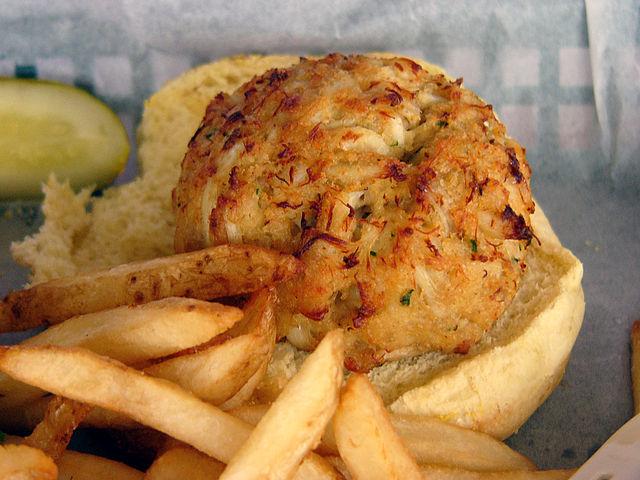
Maryland crab cakes are as important to Baltimore’s heritage as Hairspray, the Star Spangled Banner and Orioles baseball. In fact, many would say a visit to Maryland would be lacking without sampling them, whether you are vacationing on the Eastern Shore or in the DC area for a business meeting. Restaurants such as Phillips Seafood, Obryckis and Faidley’s have built an enduring business thanks to this local specialty.
The blue crab, which enjoys the reputation for making the tastiest crab cakes, is one of the most treasured resources to come out of the Chesapeake Bay. The past 30 years however, the blue crab, along with other local species, has been threatened due to pollution and over-harvesting. Local conservation efforts have helped stall the blue crab’s demise, but in the meantime, many food processors and restaurants have tried to compensate in creative ways.
And as a recently released Oceana study has revealed, we are not talking about the culinary no-no of using too much breading. Almost 40 percent of crab cakes tested in the survey revealed DNA evidence of fraud in the crab industry.
During the 2014 Maryland crab season, Oceana representatives collected and tested 90 crab cakes from 86 various restaurants in Baltimore, Annapolis, Washington DC and throughout the Eastern Shore. The non-profit found that 38 percent of the crab cakes were mislabeled. Instead of the main ingredient being the famous local blue crab, DNA analysis revealed that many of the crab cakes were made with imported crab, several species of which have a reputation for hardly qualifying as sustainable seafood.
Because not all of the restaurants actually make their own crab cakes, Oceana did not call out any of the restaurants publicly. A representative from Oceana explained to me that seafood fraud can happen any time in what has become an increasingly complex seafood supply chain. The depressing statistic should not be that surprising. Phillips, for example, uses its brand to market canned crab that can sometimes be found on the west coast. Buyer beware, however, since usually that crab has been sourced from Indonesia. But in Phillips’ defense, they are not marketing that product as “Maryland blue crab.”
But Oceana found that the mislabeled crab cakes carried the moniker “Maryland” or “blue crab.” Most of the falsely labeled crab was from the Indo-Pacific region, while a small portion was found to have come from the Mexican Pacific coast. In addition, improvements in the Chesapeake Bay’s environmental stewardship has earned the Maryland blue crab a “best choice” or “good alternative” on most seafood guides, while half of the other species detected in Oceana’s testing are marked as “avoid” on those same lists. Furthermore, consumers are overpaying for a dinner that cost them top dollar: $15 to $30 per crab cake is the price of what these delicacies go for at most restaurants.
“When you’re paying a premium for a particular product, that’s exactly what you should receive,” says Duston Cranor, Communications Director of U.S. Campaigns at Oceana. “Whether you’re purchasing local blue crab for the taste or simply to support the local community, consumers need to know that they’re getting what they’re paying for. Tracking crabs and other seafood from the boat to your dinner plate is the only way to ensure that it’s safe, legally caught and honestly labeled.”
Oceana has completed similar studies revealing fraud in the general seafood industry as well as with shrimp. As a result of all of these studies, Oceana has implored the seafood industry to increase traceability standards so that all fish and shellfish in the United States is sourced legally and responsibly.
Image credit: Kathleen Conklin

Leon Kaye has written for 3p since 2010 and become executive editor in 2018. His previous work includes writing for the Guardian as well as other online and print publications. In addition, he's worked in sales executive roles within technology and financial research companies, as well as for a public relations firm, for which he consulted with one of the globe’s leading sustainability initiatives. Currently living in Central California, he’s traveled to 70-plus countries and has lived and worked in South Korea, the United Arab Emirates and Uruguay.
Leon’s an alum of Fresno State, the University of Maryland, Baltimore County and the University of Southern California's Marshall Business School. He enjoys traveling abroad as well as exploring California’s Central Coast and the Sierra Nevadas.














